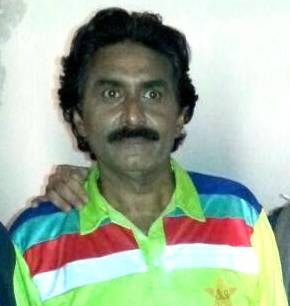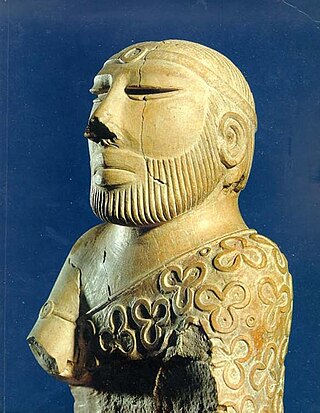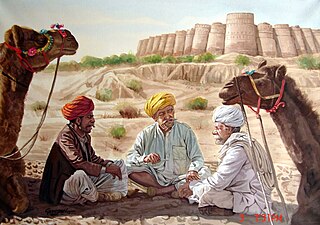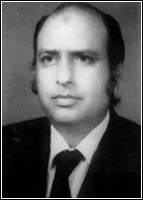
Pakistan, officially the Islamic Republic of Pakistan, is a country in South Asia. It is the fifth-most populous country, with a population of over 241.5 million, having the largest Muslim population as of 2023. Islamabad is the nation's capital, while Karachi is its largest city and financial centre. Pakistan is the 33rd-largest country by area, being the second largest in South Asia. Bounded by the Arabian Sea on the south, the Gulf of Oman on the southwest, and the Sir Creek on the southeast, it shares land borders with India to the east; Afghanistan to the west; Iran to the southwest; and China to the northeast. It shares a maritime border with Oman in the Gulf of Oman, and is separated from Tajikistan in the northwest by Afghanistan's narrow Wakhan Corridor.

Muhammad Zia-ul-Haq was a Pakistani military officer who served as the sixth president of Pakistan from 1978 until his death. He also served as the second chief of the army staff of the Pakistan Army from 1 March 1976 until his death.

Imran Ahmed Khan Niazi is a Pakistani politician and former cricketer who served as the 22nd prime minister of Pakistan from August 2018 until April 2022. He is the founder and former chairman of the political party Pakistan Tehreek-e-Insaf (PTI) from 1996 to 2023. He was the captain of the Pakistan national cricket team throughout the 1980s and early 90s.

Mohammad Javed Miandad PP SI, popularly known as Javed Miandad, is a Pakistani cricket coach, commentator and former cricketer known for his unconventional style of captaincy and batting. ESPNcricinfo described him as "the greatest batsman Pakistan has ever produced" and his contemporary Ian Chappell extolled him as one of the finest batsmen in the history of cricket.

The Bangladesh Liberation War was a revolution and armed conflict sparked by the rise of the Bengali nationalist and self-determination movement in East Pakistan, which resulted in the independence of Bangladesh. The war began when the Pakistani military junta based in West Pakistan—under the orders of Yahya Khan—launched Operation Searchlight against the people of East Pakistan on the night of 25 March 1971, initiating the Bangladesh genocide.
The following pages for each decade list films produced in Pakistan by year of release.

Radio Pakistan serves as the national public broadcaster for radio in Pakistan. Although some local stations predate Radio Pakistan's founding, it is the oldest existing broadcasting network in Pakistan. The network was established on 14 August 1947, following Pakistan's independence from Britain. Radio Pakistan services include AM news services and FM 101 (music) and FM 93.

Nazia Hassan was a Pakistani singer-songwriter, lawyer and social activist. Referred to as the Queen of South Asian Pop, she is considered one of the most influential singers in Pakistan and India as well. Starting in the 1980s, as part of the duo Nazia and Zoheb, she and her brother Zoheb Hassan, have sold over 65 million records worldwide.
This article describes the history of cricket in Pakistan from the 1970–71 season to 1984–85.

Pakistan first participated in the Olympic Games in 1948 in London, and has sent athletes to compete in every Summer Olympic Games since then, except for when they participated in the American-led boycott of the 1980 Summer Olympics in the Soviet Union. It has participated in every Winter Olympic Games since the Vancouver 2010 Winter Olympics, when alpine skier Mohammad Abbas became the first Pakistani athlete to qualify for a Winter Olympics event.

Jammu and Kashmir, also known as Kashmir and Jammu, was a princely state in a subsidiary alliance under British East India Company rule from 1846 to 1858 and under the paramountcy of the British Crown, from 1858 until the Partition of India in 1947, when it became a disputed territory, now administered by three countries: China, India, and Pakistan. The princely state was created after the First Anglo-Sikh War, when the East India Company, which had annexed the Kashmir Valley, from the Sikhs as war indemnity, then sold it to the Raja of Jammu, Gulab Singh, for rupees 75 lakhs.

Military coups in Pakistan began in 1958 when military officer Muhammad Ayub Khan overthrew and exiled president Iskandar Ali Mirza. Since its creation in 1947, Pakistan has spent several decades under military rule. After their respective terms in office, each of the past five prime ministers of Pakistan has faced convictions or imprisonment. This trend highlights a significant aspect of Pakistan's political landscape: the prevailing rule that the Pakistani military exercises influence wherever it deems necessary, often persisting despite potential repercussions. Throughout Pakistan's history, the military has played a prominent role in governance, with periods where it has directly ruled the country.

The Saraikis, are a Indo-Aryan ethnolinguistic group native to the Southwestern region of the Punjab province of Pakistan. They are multi-ethnic in origin and speak the Saraiki language.

Pervez Malik was a Pakistani film director. He was the director of Pakistan's first platinum jubilee film, "Armaan" (1966). He directed more than 20 films, mostly in Urdu language, and received excellent reviews for many of his films from both film critics and the public.

The Pakistan Super League (PSL) is a men's Twenty20 cricket league contested by six city-based franchise teams. The league was founded in 2015 by the Pakistan Cricket Board. Instead of operating as an association of independently owned teams, the league is a single entity in which each franchise is owned and controlled by the investors.
Mawlanā Syed Muntakhab al-Ḥaqq was the dean of the faculty of Islamic studies at the University of Karachi, Pakistan, from 1964 to 1972. He was named a jurisconsult to the Federal Shariat Court in 1981, and appointed to the Council of Islamic Ideology in 1982.
Uzma Gillani is a veteran Pakistani television actress and advertiser. She, along with Khalida Riyasat, Tahira Naqvi and Roohi Bano, dominated the television screens of Pakistan from the 1970s to the 1990s.

Cannabis is illegal in Pakistan for recreational use, although since September 2020, extracts of cannabis can be used for industrial and medical use. Cannabis is widely consumed in Pakistan as charas and bhang.
The 1981–82 World Series was a One Day International (ODI) cricket tri-series where Australia played host to Pakistan and West Indies. Australia and West Indies reached the Finals, which West Indies won 3–1.
Roohi Bano, was a Pakistani actress who was known for her roles in television dramas Kiran Kahani, Zard Gulab, and Darwaza. She along with Uzma Gillani, Tahira Naqvi and Khalida Riyasat dominated Pakistan's television screens from the 1970s, to the 1990s. She was known as the Queen of Melancholy because of her portrayal of mournful and pessimistic roles in dramas and films.












